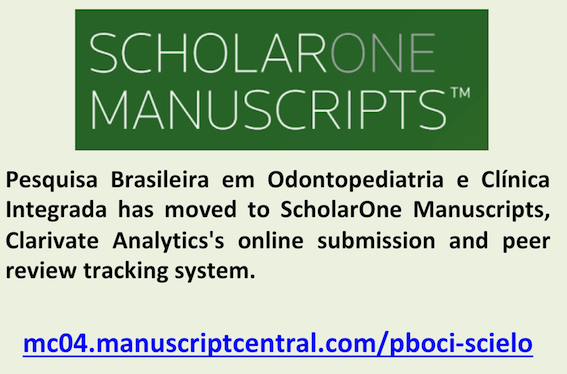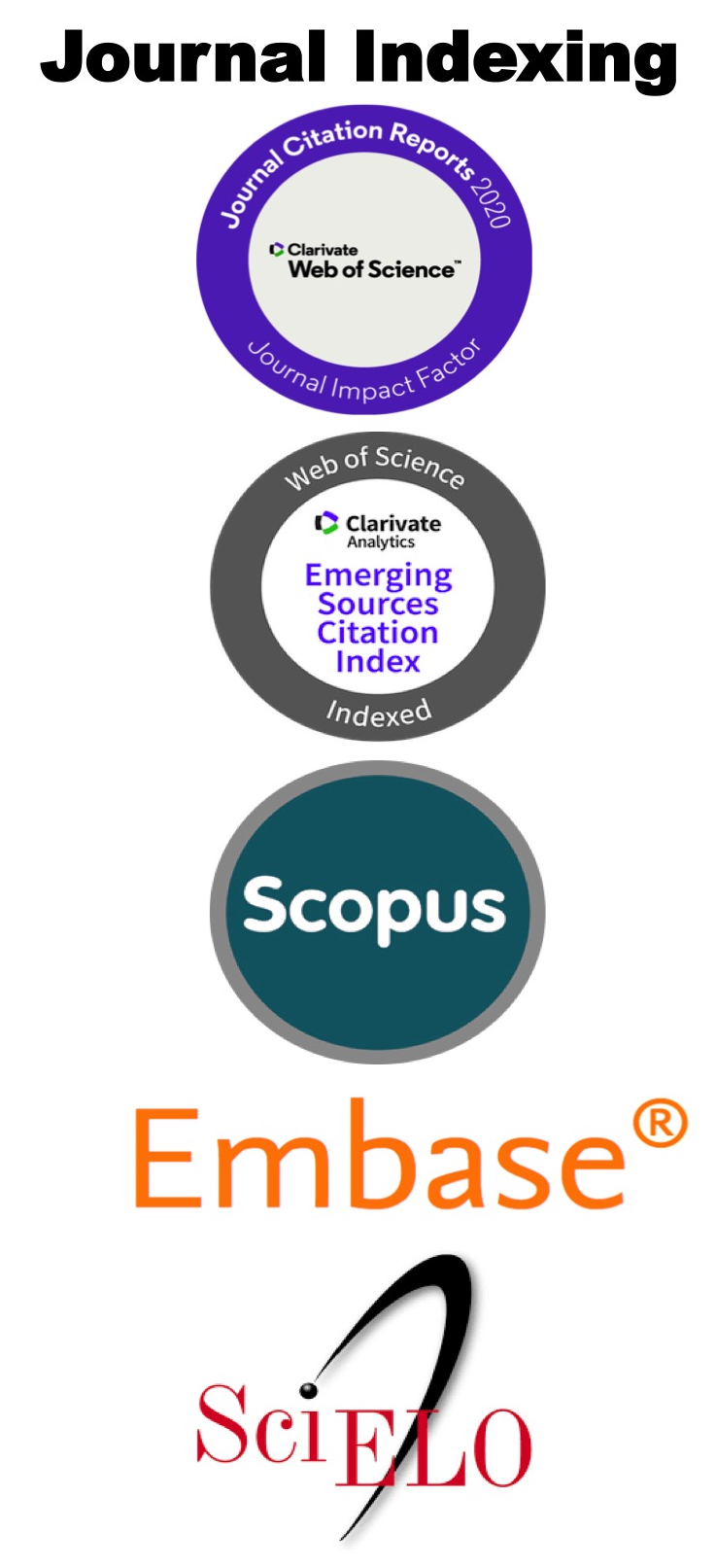Factors Associated with the Intake of Ultra-Processed Cariogenic Foods by Preschoolers During the COVID-19 Pandemic
Keywords:
Coronavirus Infections, Diet, Cariogenic, Child, PreschoolAbstract
Objective: To evaluate the characteristics and factors associated with the intake of ultra-processed cariogenic foods (UFC) by preschoolers during the COVID-19 pandemic. Material and Methods: This is a cross-sectional study involving parents of 672 children from two to five years old enrolled at public schools in Curitiba, Brazil. Parents answered a questionnaire about socioeconomic and demographic data, their behavior regarding the dietary education of their children (Parent Mealtime Action Scale - translated and validated for use in Brazil), and children's food intake (qualitative food frequency questionnaire - list of foods based on a report from the Pan American Health Organization). The data were analyzed using Poisson regression analysis (α=0.05). Results: About 43% of parents/guardians reported changes in their children's diet during the pandemic, being that diet got worse and better in 19% and 24% of the cases, respectively. The ultra-processed cariogenic foods with the highest daily intake frequencies were sweetened juices/sweetened drinks (0.52), followed by cookies (0.37), and candies (0.35). Parents with a lower level of education reported a daily frequency of UCF intake 1.36 times higher (PR=1.359; CI 95%: 1.106-1.669) in their children compared to those with a higher level of education. On the other hand, parents’/guardians’ report of higher intake and greater offer of fruits and vegetables to children was associated with low UCF intake (PR=0.716; CI 95%: 0.592-0.866). Conclusion: The lower level of formal education of parents/guardians and lower availability of fruits and vegetables were related to higher consumption of ultra-processed cariogenic foods by children.
References
World Health Organization. Novel Coronavirus (2019-nCoV): Situation Report - 22. 2020. Available from: https://www.who.int/docs/defaultsource/coronaviruse/situation-reports/20200211-sitrep-22-ncov.pdf?sfvrsn=fb6d49b1_2. [Accessed on May 10, 2022].
Gorbalenya A, Baker SC, Baric R, De Groot R. The species Severe acute respiratory syndrome-related coronavirus: classifying 2019-nCoV and naming it SARS-CoV-2. Nat Microbiol 2020; 5:536-44. https://doi.org/10.1038/s41564-020-0695-z
Melo-Oliveira ME, Sá-Caputo D, Bachur JA, Paineiras-Domingos LL, Sonza A, Lacerda AC, et al. Reported quality of life in countries with cases of COVID19: a systematic review. Expert Rev Respir Med 2021; 15(2):213-20. https://doi.org/10.1080/17476348.2021.1826315
Rodriguez CM, Lee SJ, Ward KP, Pu DF. The perfect storm: hidden risk of child maltreatment during the Covid-19 pandemic. Child Maltreat 2021; 26(2):139-51. https://doi.org/10.1177/1077559520982066
Pietrobelli A, Pecoraro L, Ferruzzi A, Heo M, Faith M, Zoller T, et al. Effects of COVID-19 lockdown on lifestyle behaviors in children with obesity living in Verona, Italy: a longitudinal study. Obesity 2020; 28(8):1382-5. https://doi.org/10.1002/oby.22861
Tso WWY, Wong RS, Tung KTS, Rao N, Fu KW, Yam JCS, et al. Vulnerability and resilience in children during the COVID-19 pandemic. Eur Child Adolesc Psychiatry 2022; 31(1):161-76. https://doi.org/10.1007/s00787-020-01680-8
Androutsos O, Perperidi M, Georgiou C, Chouliaras G. Lifestyle changes and determinants of children's and adolescents' body weight increase during the first COVID-19 lockdown in Greece: The COV-EAT study. Nutrients 2021; 13(3):930. https://doi.org/10.3390/nu13030930
Aguilar-Farias N, Toledo-Vargas M, Miranda-Marquez S, Cortinez-O'Ryan A, Cristi-Montero C, Rodriguez-Rodriguez F, et al. Sociodemographic predictors of changes in physical activity, screen time, and sleep among toddlers and preschoolers in Chile during the COVID-19 pandemic. Int J Environ Res Public Health 2020; 18(1):176. https://doi.org/10.3390/ijerph18010176
Francisco R, Pedro M, Delvecchio E, Espada JP, Morales A, Mazzeschi C, et al. Psychological symptoms and behavioral changes in children and adolescents during the early phase of COVID-19 quarantine in three European countries. Front Psychiatry 2020; 11:570164. https://doi.org/10.3389/fpsyt.2020.570164
Adams EL, Caccavale LJ, Smith D, Bean MK. Food insecurity, the home food environment, and parent feeding practices in the era of COVID-19. Obesity 2020; 28(11):2056-63. https://doi.org/10.1002/oby.22996
Campagnaro R, Collet GO, Andrade MP, Salles JPDSL, Calvo Fracasso ML, Scheffel DLS, et al. COVID-19 pandemic and pediatric dentistry: fear, eating habits and parent's oral health perceptions. Child Youth Serv Rev 2020; 118:105469. https://doi.org/10.1016/j.childyouth.2020.105469
Janssen M, Chang BPI, Hristov H, Pravst I, Profeta A, Millard J. Changes in food consumption during the COVID-19 pandemic: analysis of consumer survey data from the first lockdown period in Denmark, Germany, and Slovenia. Front Nutr 2021; 8:635859. https://doi.org/10.3389/fnut.2021.635859
Philippe K, Chabanet C, Issanchou S, Monnery-Patris S. Child eating behaviors, parental feeding practices and food shopping motivations during the COVID-19 lockdown in France: (How) did they change?. Appetite 2021; 161:105132. https://doi.org/10.1016/j.appet.2021.105132
World Health Organization. Guideline: Sugars intake for adults and children, 2015. Available from: http://www.who.int/nutrition/publications/guidelines/sugars_intake/en/. [Accessed on May 10, 2022].
Souza MS, Vaz JDS, Martins-Silva T, Bomfim RA, Cascaes AM. Ultra-processed foods and early childhood caries in 0-3-year-olds enrolled at Primary Healthcare Centers in Southern Brazil. Public Health Nutr 2021; 24(11):3322-30. https://doi.org/10.1017/S1368980020002839
Louzada MLDC, Ricardo CZ, Steele EM, Levy RB, Cannon G, Monteiro CA. The share of ultra-processed foods determines the overall nutritional quality of diets in Brazil. Public Health Nutr 2018; 21(1):94-102. https://doi.org/10.1017/S1368980017001434
Rauber F, Louzada MLDC, Martinez SE, Rezende LFM, Millett C, Monteiro CA, et al. Ultra-processed foods and excessive free sugar intake in the UK: a nationally representative cross-sectional study. BMJ Open 2019; 9(10):e027546. https://doi.org/10.1136/bmjopen-2018-027546
Matos RA, Adams M, Sabaté J. Review: the consumption of ultra-processed foods and non-communicable diseases in latin america. Front Nutr 2021; 8:622714. https://doi.org/10.3389/fnut.2021.622714
Manfrinato CV, Marino A, Condé VF, Franco Mdo CP, Stedefeldt E, Tomita LY. High prevalence of food insecurity, the adverse impact of COVID-19 in Brazilian favela. Public Health Nutrition 2021; 24(6):1210-15. https://doi.org/10.1017/S1368980020005261
Litchford A, Savoie Roskos MR, Wengreen H. Influence of fathers on the feeding practices and behaviors of children: A systematic review. Appetite 2020; 147:104558. https://doi.org/10.1016/j.appet.2019.104558
Bonotto DV, Montes GR, Ferreira FM, Assunção LRDS, Fraiz FC. Association of parental attitudes at mealtime and snack limits with the prevalence of untreated dental caries among preschool children. Appetite 2017; 108:450-5. https://doi.org/10.1016/j.appet.2016.11.007
Organización Panamericana de la Salud. Alimentos y bebidas ultraprocesados na América Latina: ventas, fuentes, perfis de nutrientes e implicaciones. 2019. Available from: http://iris.paho.org/xmlui/handle/123456789/51523. [Accessed on May 10, 2022]. [In Spanish].
Petty ML, Escrivão MA, Souza AA. Preliminary validation of the Parent Mealtime Action Scale and its association with food intake in children from São Paulo, Brazil. Appetite 2013; 62:166-72. https://doi.org/10.1016/j.appet.2012.11.024
González-Monroy C, Gómez-Gómez I, Olarte-Sánchez CM, Motrico E. Eating behaviour changes during the COVID-19 pandemic: a systematic review of longitudinal studies. Int J Environ Res Public Health 2021; 18(21):11130. https://doi.org/10.3390/ijerph182111130
Luo W, Cai Q, Zhou Y, Cai Y, Song H, Zhang Y, et al. Variation of parental feeding practices during the COVID-2019 pandemic: a systematic review. BMC Public Health 2022; 22(1):1600. https://doi.org/10.1186/s12889-022-14027-6
Wang Y, Chen X, Yang Y, Cui Y, Xu R. Risk perception and resource scarcity in food procurement during the early outbreak of COVID-19. Public Health 2021; 195:152-7. https://doi.org/10.1016/j.puhe.2021.04.020
Wijtzes AI, Jansen W, Jansen PW, Jaddoe VW, Hofman A, Raat H. Maternal educational level and preschool children's consumption of high-calorie snacks and sugar-containing beverages: mediation by the family food environment. Prev Med 2013; 57(5):607-12. https://doi.org/10.1016/j.ypmed.2013.08.014
Pereira AM, Buffarini R, Domingues MR, Barros FCLF, Silveira MFD. Ultra-processed food consumption by children from a Pelotas birth cohort. Rev Saude Publica 2022; 56:79. https://doi.org/10.11606/s1518-8787.2022056003822
Leme ACB, Fisberg RM, Thompson D, Philippi ST, Nicklas T, Baranowski T. Brazilian children's dietary intake in relation to Brazil’s new nutrition guidelines: a systematic review. Curr Nutr Rep 2019; 8(2):145-66. https://doi.org/10.1007/s13668-019-0261-6
Pries AM, Filteau S, Ferguson EL. Snack food and beverage consumption and young child nutrition in low- and middle-income countries: A systematic review. Matern Child Nutr 2019; 15(Suppl 4):e12729. https://doi.org/10.1111/mcn.12729
de Oliveira PG, de Sousa JM, Assunção DGF, de Araujo EKS, Bezerra DS, Dametto JFDS, et al. Impacts of consumption of ultra-processed foods on the maternal-child health: a systematic review. Front Nutr 2022; 9:821657. https://doi.org/10.3389/fnut.2022.821657
Popkin BM. Global nutrition dynamics: the world is shifting rapidly toward a diet linked with noncommunicable diseases. Am J Clin Nutr 2006; 84(2):289-98. https://doi.org/10.1093/ajcn/84.2.289
Jafri A, Mathe N, Aglago EK, Konyole SO, Ouedraogo M, Audain K, et al. Food availability, accessibility and dietary practices during the COVID-19 pandemic: a multi-country survey. Public Health Nutr 2021; 24(7):1798-1805. https://doi.org/10.1017/S1368980021000987
Monteiro CA, Levy RB, Claro RM, de Castro IR, Cannon G. Increasing consumption of ultra-processed foods and likely impact on human health: evidence from Brazil. Public Health Nutr 2011; 14(1):5-13. https://doi.org/10.1017/S1368980010003241
Imamura F, O'Connor L, Ye Z, Mursu J, Hayashino Y, Bhupathiraju SN, et al. Consumption of sugar sweetened beverages, artificially sweetened beverages, and fruit juice and incidence of type 2 diabetes: systematic review, meta-analysis, and estimation of population attributable fraction. BMJ 2015; 351:h3576. https://doi.org/10.1136/bmj.h3576
Ooi JY, Wolfenden L, Sutherland R, Nathan N, Oldmeadow C, Mclaughlin M, et al. A systematic review of the recent consumption levels of sugar-sweetened beverages in children and adolescents from the World Health Organization regions with high dietary-related burden of disease. Asia Pac J Public Health 2022; 34(1):11-24. https://doi.org/10.1177/10105395211014642
Costa CDS, Buffarini R, Flores TR, Neri D, Freitas Silveira M, Monteiro CA. Consumption of ultra-processed foods and growth outcomes in early childhood: 2015 Pelotas Birth Cohort. Br J Nutr 2022; 12:1-22. https://doi.org/10.1017/S0007114522002926
Musicus AA, Hua SV, Moran AJ, Duffy EW, Hall MG, Roberto CA, et al. Front-of-package claims & imagery on fruit-flavored drinks and exposure by household demographics. Appetite 2022; 171:105902. https://doi.org/10.1016/j.appet.2021.105902
Groele B, Głąbska D, Gutkowska K, Guzek D. Mother's fruit preferences and consumption support similar attitudes and behaviors in their children. Int J Environ Res Public Health 2018; 15(12):2833. https://doi.org/10.3390/ijerph15122833
Yee AZ, Lwin MO, Ho SS. The influence of parental practices on child promotive and preventive food consumption behaviors: a systematic review and meta-analysis. Int J Behav Nutr Phys Act 2017; 14(1):47. https://doi.org/10.1186/s12966-017-0501-3
Downloads
Published
How to Cite
Issue
Section
License
Copyright (c) 2023 Pesquisa Brasileira em Odontopediatria e Clínica Integrada

This work is licensed under a Creative Commons Attribution-NonCommercial 4.0 International License.



